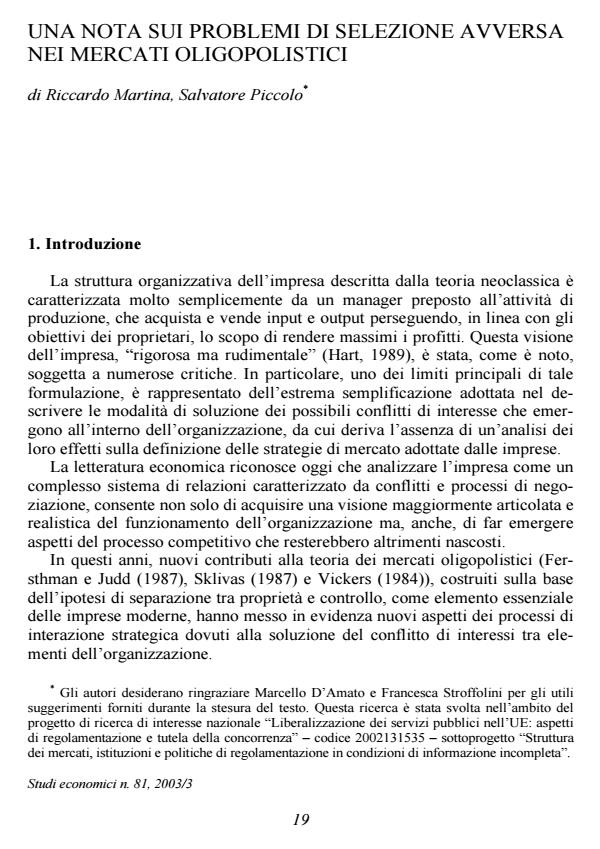Una nota sui problemi di selezione avversa nei mercati oligopolistici
Titolo Rivista STUDI ECONOMICI
Autori/Curatori Riccardo Martina, Salvatore Piccolo
Anno di pubblicazione 1 Fascicolo 2003/81 Lingua Italiano
Numero pagine 20 P. Dimensione file 159 KB
DOI
Il DOI è il codice a barre della proprietà intellettuale: per saperne di più
clicca qui
Qui sotto puoi vedere in anteprima la prima pagina di questo articolo.
Se questo articolo ti interessa, lo puoi acquistare (e scaricare in formato pdf) seguendo le facili indicazioni per acquistare il download credit. Acquista Download Credits per scaricare questo Articolo in formato PDF

FrancoAngeli è membro della Publishers International Linking Association, Inc (PILA)associazione indipendente e non profit per facilitare (attraverso i servizi tecnologici implementati da CrossRef.org) l’accesso degli studiosi ai contenuti digitali nelle pubblicazioni professionali e scientifiche
This paper analyzes the effects of adverse selection in oligopolistic markets. The note is aimed at characterizing the relationship between competition and market distortions entailed by adverse selection. First, we examine the case of a monopolistic firm where the owner delegates the production of a good to a manager who possesses private information on the technology (marginal cost). Second, we extend the analysis to the case of Cournot competition with N vertical hierarchies. In this framework, we show that the contract implemented within each owner-manager pair entails quantity distortion and makes consumers worse off with respect to the complete information framework. However, we show that despite of the allocative inefficiency due to adverse selection it may be the case that all the owners are better-off with respect to the case of incomplete information. This effect is due to the rise in marginal costs entailed by the presence of an informational rent that each owner must pay in order to extract the information from the agent. Finally, we show that in a Stackelberg game where firms’ marginal costs are perfectly correlated, the effects of adverse selection are negligible since a signalling issue arises. More specifically, the owner of the firm acting as a leader signals the realization of the marginal costs to her competitors (owners of the follower firms) through the contract offered to the manager. It follows that, in this setting, a second mover advantage may arise at equilibrium.;
Riccardo Martina, Salvatore Piccolo, Una nota sui problemi di selezione avversa nei mercati oligopolistici in "STUDI ECONOMICI " 81/2003, pp , DOI: